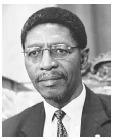LESOTHO
Pakalitha Mosisili
Prime Minister

(pronounced "PAK-a-leeth-a mo-see-SEE-lee")
"Peace and stability are essential preconditions to economic development … Our geographical position within South Africa eliminates chances for an external threat. Our enemies are therefore internal."
The Kingdom of Lesotho (pronounced "leh-SOO-too") is a landlocked enclave of 30,355 sq km (11,720 sq mi), surrounded by the Republic of South Africa. It is a country of rugged mountainous terrain, dissected by deep river valleys at elevations of 8,100 to 17,700 m (approximately 5,000 to 11,000 ft) above sea level.
Most Basotho, as the people of Lesotho are called, are of southern Sotho origin and speak Sesotho, a Bantu language. English is the official language, but many Basotho are also fluent in other southern African languages or Afrikaans. Europeans, Asians, and people of mixed origins constitute less than 1% of Lesotho's citizens.
Lesotho's population was estimated at 2.2 million in July 2002. Over 80% of the resident population engages in subsistence farming, but agriculture accounts for just 20% of gross domestic product (GDP) and basic foodstuffs must be imported. Most of Lesotho's arable land is in the west of the country, with high population densities reaching 200 per sq km (500 per sq mi). The result of the geographic constraints, combined with the growing population and periodic droughts, has been land shortage, soil erosion, and falling agricultural productivity. Maize is the staple crop. Sorghum, beans, dry peas, oats, and sunflower oil are also cultivated. Summer wheat is the only export crop for Lesotho, most going to South Africa. Cattle exports, along with wool and mohair, also contribute to the agricultural earnings of the country, though this sector of the economy is underexploited.
Lesotho's major export continues to be laborers to South African mines, farms, and industry; roughly 35% of Lesotho's adult male wage-earners work in South Africa. Up to 60% of annual household income is derived from migrant remittances, which also represent 45% of Lesotho's gross national product. Water export to South Africa from the Lesotho Highlands Water Project (LHWP) is achieving greater and greater importance in the country's earnings. Revenue from Lesotho's customs and monetary union with South Africa (the Southern African Customs Union) also constitutes a substantial portion of government income. In addition, foreign aid from international donors has also been a vital source of sustenance. With no exploitable mineral resources and only small-scale industries, Lesotho seeks to attract tourists with its casinos and spectacular mountains, which offer winter snow and skiing. Lesotho's unit of currency is the loti .
ADDRESS
Prime Minister's Office
P.O. Box 527
Maseru 100, Lesotho
Comment about this article, ask questions, or add new information about this topic: